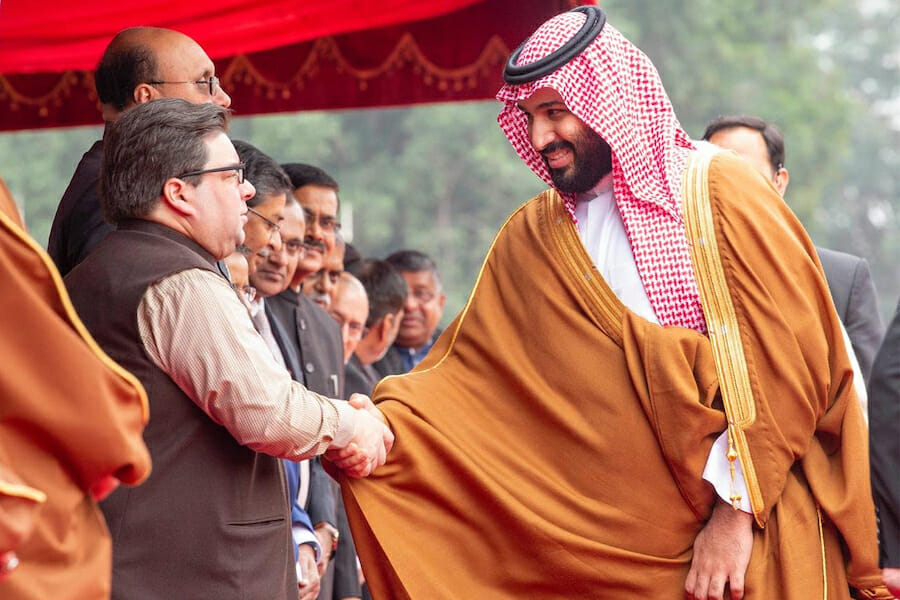
Saudi Arabia’s Vision 2030 Plan and the Role of Asian Powers
The recent visits of Crown Prince Mohammed bin Salman to Islamabad, Delhi, and Beijing highlight Saudi Arabia’s foreign policy reformulations catering to the requirements of the Vision 2030 plan of the Kingdom. The oil-rich Kingdom has seen a series of reforms in recent years in order to diversify its economy and improve the image of the country. As a part of these efforts, Saudi Arabia has affirmed that the role of Asian powers is inevitable to execute the Vision 2030 plan and hence strengthening cooperation with Pakistan, India and China is crucial for the Kingdom at this juncture.
One of the main pillars of the Vision 2030 plan is to emblazon Saudi Arabia as the heart of the Arab and Islamic worlds and the support of Pakistan, in this case, is ineluctable. Saudi Arabia and Pakistan are strong poles in the Islamic world and play major roles in the changing dynamics of global geopolitics. The relationship between both these countries in recent times has seen exponential growth with respect to trade and economic ties. Less than six months ago during Prime Minister Imran Khan’s visit to Riyadh, the Kingdom agreed 6 billion US dollars aid to Pakistan and during the very recent visit of the Crown Prince Mohammed bin Salman to Islamabad, several MoU’s were signed between both the countries. Saudi Arabia’s investment deals in the petrochemical, minerals, energy and other sectors that account to more than 20 billion US dollars is definitely a relief at the right time for Pakistan. Another major aspect of the Kingdom’s interest in Pakistan is with respect to an unacknowledged nuclear deterrence that Pakistan could provide Saudi Arabia whenever needed. It is unlikely that Saudi Arabia, a signatory to the Nuclear Non-Proliferation Treaty would attempt to seek nuclear weapons because of the repudiation it could bring which the Kingdom cannot afford at this point in time and hence it is important for Riyadh to further strengthen the relationship with Islamabad primarily because of the military power of Pakistan.
The primary agenda of the Vision 2030 plan is to transform the Kingdom into a global investment powerhouse. Both India and China play crucial roles in a mutually benefitting engagement with Saudi Arabia with respect to Kingdom’s aspiration to transform itself as an investment powerhouse and the recent visit of MbS highlights the role of Delhi and Beijing in this process. For India, as a part of its ‘Link West’ policy, it is imperative to strengthen cooperation with Saudi Arabia primarily for energy security and to stabilize the remittances it receives annually. Saudi Arabia is home to more than 3 million Indians and considering the fact that Indian migrants in the Kingdom generate remittances more than $10 billion annually stresses the need for India to stabilize its interests amid the nationalization process of the Saudi government. During the recent visit of MbS to Delhi, investment deals in diverse sectors that include energy, agriculture, education, and health potentially worth in excess of $100 billion were signed. Indian business enterprises in the Kingdom is called for widening investment opportunities in non-oil sectors under the Vision 2030 plan and considering the fact that India has been the Kingdom’s one of the biggest trading partners it further encapsulates the significance of the bilateral relationship between both the countries.
The last major visit made by MbS to Beijing is crucial in the current scenario as China has vouched to deepen its cooperation with Iran. China has affirmed that it will not be involved in the regional politics of the Middle East and will cooperate with all the countries for mutual benefit. Saudi Arabia has slid their regional agendas under the carpet while dealing with India and China since they ascertain the fact that Asian markets are going to be their premier customers. Saudi Arabia has been on the verge of surpassing Russia as the largest crude supplier to China and as per recent reports, Saudi Aramco will sign a pact to build a refinery and a petrochemical project in a joint venture with Chinese defense corporation Norinco in China. China would be the strongest link for Saudi Arabia to diversify its economy undoubtedly and with a positive response from Beijing for the Saudi investments in Gwadar, Riyadh hopes to enhance its economic connectivity through such participation. The only concern for Riyadh is that Beijing has been pushing for a Petro-yuan deal which could put Riyadh in a difficult position, although at present Riyadh has not responded to such a demand.
The Kingdom now faces more pressure as foreign investors have started pulling out from the country’s market after the alleged link of Mohammed bin Salman in the killing of Washington Post journalist Jamal Khashoggi. It is clear that Saudi Arabia amid international condemnation, negative response from investors and warnings from the West is now keen on stronger engagements with Asian powers. With many countries of the European Union like Germany demanding to suspend arms exports to Saudi Arabia and the US Congress voting to withdraw military assistance for Saudi Arabia’s war on Yemen, it is necessary for Saudi Arabia to increase its bandwidth of foreign policy and to engage actively with new regional powers in South Asia and East Asia. To execute a holistic and comprehensive plan like the Vision 2030 amid a serious image problem for Saudi Arabia it is necessary for the Kingdom to accelerate its engagements with Asian powers that can help to transform the Kingdom to an investment hub and project Riyadh as the vital locus of the Islamic world.
